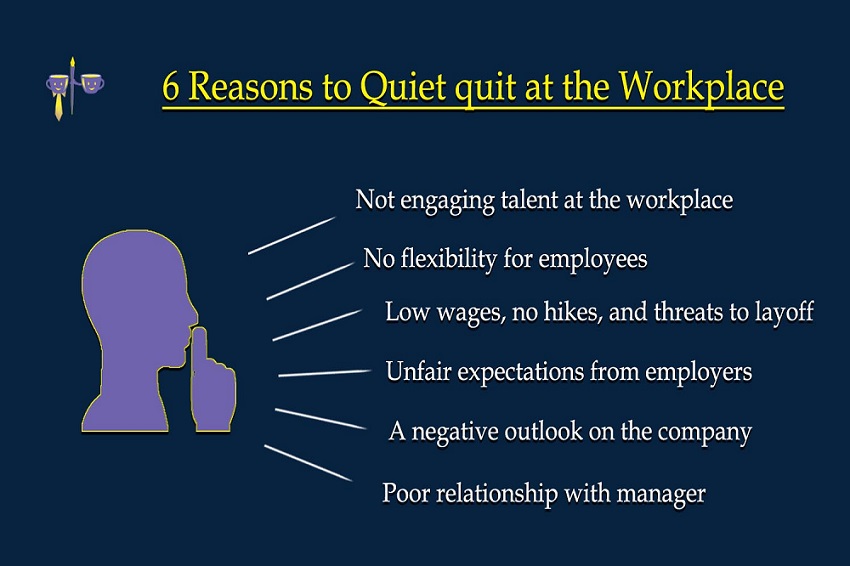Understanding Quiet Quitting at the Workplace
The clock strikes 5 pm, and you’ve been working for 7-8 hours. You have replied to the emails, attended your meetings, and done the bare minimum until it’s time to call it a day. There’s an interesting project and a challenge that awaits for you to resolve, and suddenly it becomes the least interesting thing you want to do at work.
Well, after all, your wage is stagnant, and the promotion you wanted isn’t
coming your way. You know your employer is indifferent about your career aspirations, so it’s high time that you start being indifferent too.
If this sounds like you, you are an example of quiet quitting at work.
What is Quiet Quitting at the Workplace?
Around half of the United States workforce is quiet quitting, according to Gallup. While quiet quitting practice isn’t something new, the trend has taken over social media recently.
Some think it’s a problem because most jobs today require some level of extra effort to collaborate with coworkers and meet customers’ needs.
However, research from Harvard Business Review says that quiet quitting is less about employees’ motivation to work and more about managers’ ability to build relationships with employees.
Like it or not, it indirectly is an impact of two years of work-from-home or hybrid office models that have taken over all organizations. And it is garnering attention as a response to pandemic-induced stress or burnout.
What are the factors increasing quiet quitting at the workplace?
Let’s look at the factors influencing quiet quitting.

To start with, burnout and quiet quitting aren’t the same. The reasons for quite quitting vary among different people. A few of them are:
Lack of connection or engagement with the organization: Employees who do not feel connected or engaged with their organization are more likely to quit quietly. When employees feel that they have nothing to lose, then they do not want to invest their attention in the work or the organization.
Poor management or communication: Employees who feel wanted or have not received communication or support from their managers are likely to quit quietly. If they feel that their concerns or issues have not been addressed, they may feel that there is no point in announcing their departure.
Managers should make it a point to establish connections with their team.
Job security: Do your employees feel insecure about their jobs?
If their positions are temporary then they’re more likely to quiet quit. They may not feel that they have the same obligations as full-time employees and may not want to risk losing future opportunities.
On the other hand, employees who fear being fired or receiving negative feedback may choose to quit quietly. They would not want to risk their future job prospects by creating a conflict with their current employer.
Personal or family reasons: Well, this may not happen quite often. But an employee wants to quiet quit because he/she wants to care for a sick family member or pursue a new career path that is not relevant to the current job.
How to stop quiet quitting from ruining your career?
It can be easy to join the quiet quitting trend, but it does not work for every individual.
No one can be engaged at work all the time, and that is fine. Quiet quitting for a short period may help you avoid burnout. But, if having a job is important for you, it’s smart to avoid quiet quitting to some extent.
Instead, you should
- Voice out your concerns to your boss. You can have open communication about your pay, workload, timings, or anything else. Try to work together to solve the issue at hand.
- Take time to recharge. Take short breaks from work to refresh your mind and work productively.
- Set boundaries at the workplace. Allow yourself to spend sufficient time with family, friends, and hobbies. Ensure you enjoy things outside your professional life.
- Try exploring new opportunities. If you think your current job or work is not helping you grow, refine your skillset, revisit your goals, and find new opportunities to grow.
How to stop your employees from quiet quitting and promote positivity
If you want to prevent your employees from quitting quietly, there are several things you can do to improve their work experience and increase their engagement with your organization:
Create a positive workplace culture
Create a sense of community, recognize your team’s efforts, and reward their good work. Be open and communicate any feedback that you have. Ensure your team and work environment is positive so your employees would be more invested in their work.
Competitive compensation and benefits
Providing competitive compensation and benefits packages can help to retain employees and increase their satisfaction with their job. This may include salary rise, bonuses, health insurance, retirement plans, and other perks.
Provide opportunities for growth and development
You need to motivate your team to grow and develop in their career. As part of that, ensure you provide opportunities that will help them upscale their skills. This will help them stay engaged and motivated. You can try including training programs, mentoring, job rotations, and leadership development.
Improve communication and feedback
Providing regular feedback and communication to employees can help them feel supported and valued. Schedule regular check-ins with your team to understand how they’re progressing in their job and what can be implemented to ensure a smooth flow of work and communication. You can also use performance evaluations to provide constructive feedback.
Address issues promptly
If employees do have issues or concerns, it is important to address them promptly and effectively. This can be achieved by listening to employees, taking their concerns seriously, and working together to find solutions.
Use these steps to create a more positive and supportive work environment that your employees want to work in and that can further reduce the likelihood of quiet quitting at the workplace.
If you are an employee, try to find resources or ask for resources if you want to participate actively in your workplace. Individuals should give time and energy to the organizations and value the growth and development of the company.
On the other hand, if you belong to the leadership team, you should adapt to the changing workplace values. Provide value in terms of monetary benefits, flexibility, or something else in return to the employee to have them engaged in the workplace.





Knowledgeable data mentioned in the post.
Detailed Information. thanks.